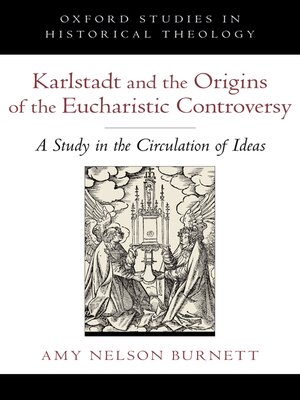Karlstadt and the Origins of the Eucharistic Controversy
ebook ∣ A Study in the Circulation of Ideas · Oxford Studies in Historical Theology
By Amy Nelson Burnett

Sign up to save your library
With an OverDrive account, you can save your favorite libraries for at-a-glance information about availability. Find out more about OverDrive accounts.
Find this title in Libby, the library reading app by OverDrive.



Search for a digital library with this title
Title found at these libraries:
| Loading... |
The debate over the Lord's Supper had momentous consequences for the Reformation, causing the division of the evangelical movement, influencing the formation of political alliances, and contributing to cultural differences among the Protestant territories of Germany and Switzerland. Karlstadt and the Origins of the Eucharistic Controversy is the first full-length study of the beginning of that debate. Going beyond the traditional focus on Martin Luther and Ulrich Zwingli, it emphasizes the diversity of the "sacramentarian" challenge to traditional belief in Christ's corporeal presence in the bread and wine of the Eucharist, and it re-evaluates the significance of Luther's colleague, Andreas Bodenstein von Karlstadt, for the debate. Burnett describes Luther's earliest criticisms of the mass and the efforts in Wittenberg to reform liturgical praxis to correspond with his ideas. She then looks at pamphlets written by other reformers to show how Luther's understanding of the sacrament was adapted and modified outside of Wittenberg. Ultimately, Burnett shows how Karlstadt's eucharistic pamphlets introduced into the public debate arguments that would become standard Reformed criticisms of the Lutheran position. The book also demonstrates the influence not only of Erasmus but also of John Wyclif and the Hussites for discussions of the sacrament, highlights the role of the reformers of Basel and Strasbourg for developing the "Zwinglian" understanding of the Lord's Supper, and draws attention to the early eucharistic theology of the Silesians Kaspar Schwenckfeld and Valentin Krautwald. This book will be an indispensable guide for readers seeking to understand the issues surrounding the outbreak of the eucharistic controversy in the sixteenth century.






